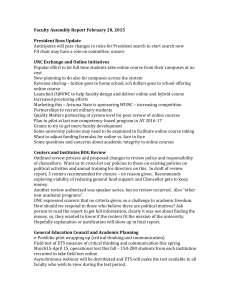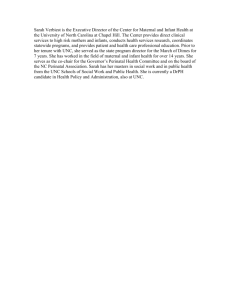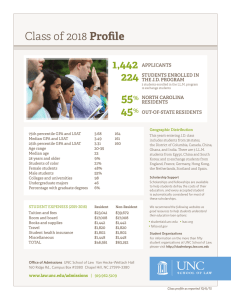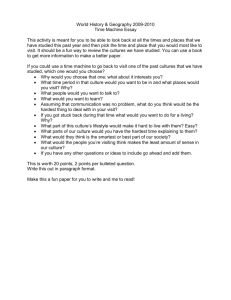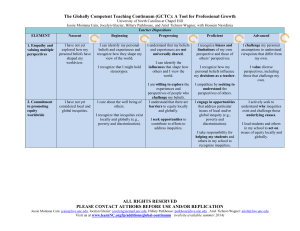Why Learn Another Goals of the SEcond Language? Language Standard
advertisement
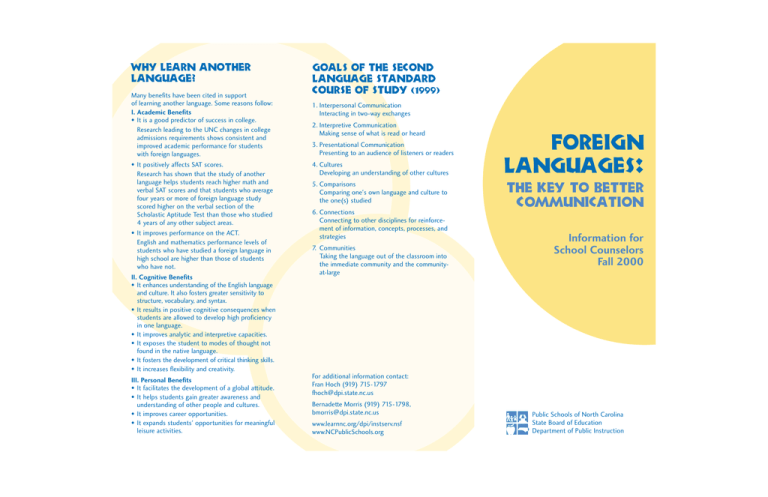
Why Learn Another Language? Many benefits have been cited in support of learning another language. Some reasons follow: I. Academic Benefits • It is a good predictor of success in college. Research leading to the UNC changes in college admissions requirements shows consistent and improved academic performance for students with foreign languages. • It positively affects SAT scores. Research has shown that the study of another language helps students reach higher math and verbal SAT scores and that students who average four years or more of foreign language study scored higher on the verbal section of the Scholastic Aptitude Test than those who studied 4 years of any other subject areas. • It improves performance on the ACT. English and mathematics performance levels of students who have studied a foreign language in high school are higher than those of students who have not. II. Cognitive Benefits • It enhances understanding of the English language and culture. It also fosters greater sensitivity to structure, vocabulary, and syntax. • It results in positive cognitive consequences when students are allowed to develop high proficiency in one language. • It improves analytic and interpretive capacities. • It exposes the student to modes of thought not found in the native language. • It fosters the development of critical thinking skills. • It increases flexibility and creativity. III. Personal Benefits • It facilitates the development of a global attitude. • It helps students gain greater awareness and understanding of other people and cultures. • It improves career opportunities. • It expands students' opportunities for meaningful leisure activities. Goals of the SEcond Language Standard Course of Study (1999) 1. Interpersonal Communication Interacting in two-way exchanges 2. Interpretive Communication Making sense of what is read or heard 3. Presentational Communication Presenting to an audience of listeners or readers 4. Cultures Developing an understanding of other cultures 5. Comparisons Comparing one's own language and culture to the one(s) studied 6. Connections Connecting to other disciplines for reinforcement of information, concepts, processes, and strategies 7. Communities Taking the language out of the classroom into the immediate community and the communityat-large Foreign Languages: The Key To Better Communication Information for School Counselors Fall 2000 For additional information contact: Fran Hoch (919) 715-1797 fhoch@dpi.state.nc.us Bernadette Morris (919) 715-1798, bmorris@dpi.state.nc.us www.learnnc.org/dpi/instserv.nsf www.NCPublicSchools.org Public Schools of North Carolina State Board of Education Department of Public Instruction Requirements Which Language? Myths • New High School Graduation Requirements In June 2000, the State Board of Education voted to change the high school graduation requirements to address the recent UNC University admissions requirements. Ninth graders who enter high school for the first time in 2000-01 and who choose the College/University Prep Course of Study will need to complete 2 credits in the same foreign language in order to graduate. At this time, there are no state end-of-course tests. • New UNC University Foreign Language Admissions Requirement In April 2000, the UNC Board of Governors chose to increase the minimum course requirements for undergraduate admission. It voted that two units of the same foreign language be required for admission, effective in the fall semester of 2004. In adopting this new requirement, the UNC Board of Governor removed the suggestion that one of those units be taken in the senior year. • Other colleges and universities vary in their language requirements. Most require or recommend at least two units in the same foreign language. Some may recommend more. For specific information, students should contact the college of their choice. • International Baccalaureate: Study of 2 different languages. • Scholar's Program: 2 units of the same foreign language, 2 additional units to be selected from: English, Mathematics, Science, Social Studies and/or Foreign Languages. • Weighted Courses: Courses above level II are Honors courses and are weighted. I extra QP for Honors courses, and 2 extra QP for AP courses. There is no easy answer. The most commonly offered languages in North Carolina's high schools are: Spanish, French, Latin, German, and Japanese. Myth 1 What matters most in choosing a language is that students have a choice of languages. Additionally, students should be encouraged to select a language based on their interests and not on their academic achievement in other disciplines. Whichever language a student chooses, the study of that language will help him/her enlarge his/her view of other people and languages. Guidelines Guidelines • Students may jeopardize their chances for graduating and for meeting college entrance requirements by waiting until the last 2 years (or last 2 semesters) of high school to enroll in foreign language courses. • Longer sequences of language study yield the greatest academic, practical, and aesthetic benefits. • Students with previous language experience at the middle or elementary level need to be placed at the appropriate level. • Students should sign up for levels I and II consecutively on a block schedule (4x4). If a break has to occur, it is better to schedule it between advanced levels (II and III or III and IV). Spanish is easier than French. Both languages are based on Latin and are similar in grammar and vocabulary; however, the pronunciation varies: in Spanish most letters are pronounced whereas in French many are silent. Myth 2 You do not need a foreign language if you are not going to college. " The workplace of tomorrow is a world of many cultures and languages... with new forms of global commerce we can’t even imagine today" (Kiplinger Washington Editors, 1996). Myth 3 Only students who do well in English can learn a foreign language. ALL students can learn a foreign language when the focus is communication and proficiency.
